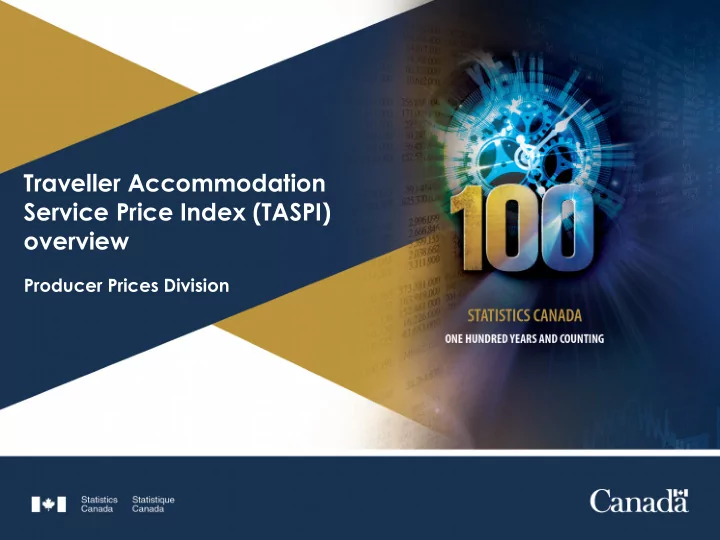

Traveller Accommodation Service Price Index (TASPI) overview Producer Prices Division
Outline • Overview of the industry • General framework TASPI • Evaluation of measurement: new initiatives/the future • Conclusion
Definition of the Industry The Traveller Accommodation Services Price Index (TASPI) covers Hotels (except casino hotels) and motels (NAICS 72111, ISIC I5510) This industry comprises establishments primarily engaged in providing short-term lodging in facilities known as hotels, motor hotels, resort hotels and motels. These establishments may offer food and beverage services, recreational services, conference rooms and convention services, laundry services, parking and other services.
Market Conditions • The Accommodation Services industry has accounted for on average 0.63% of GDP since 2012 • There were 190,850 total jobs in the Accommodation Services industry in 2018 • Full-time workers accounted for on average 78% of the total number of jobs for the industry since 2012 • Operating revenue for Accommodation Services reached $21.5 billion in 2017 (latest data available) • The TASPI index has a positive correlation to the overall revenue of the industry
General Framework (TASPI) • Transaction price received by an establishment (excluding taxes) for offering short-term accommodation services • Collected monthly from the internet • Room booked two weeks in advance for two different specifications, business and leisure clients • Weights correspond to the aggregated revenues calculated at the geographical stratum level • Laspeyres chain linked index • Not revised or seasonally adjusted • Index follows a seasonal pattern
New Initiatives • An Analysis of Price Movements for Short-Term Accommodation through Time • Producer Prices Division (PPD) initiative • Two basic questions were studied: • Were prices collected in advance of the reference period good predictors of prices ? • What time period is the best predictor? • The results for using the advance collection method to predict prices showed that patterns were not consistent. • One-size-fits-all national pricing pattern for all reference months would be inadvisable • Individual pricing patterns for different reference months and regions would be more appropriate • Overall, advanced collection would be useful for price substitution, data confrontation and as an indicator of future events.
New Initiatives • Measuring private short-term accommodation in Canada • National Economic Accounts Division (NEAD) initiative • Sought alternative measurement methods to help understand the overall impact of the private short-term accommodation market on the Canadian economy. • Tremendous rise recently of peer-to-peer services, e.g., individuals renting a house, with the emergence of intermediary platforms such as Airbnb and VRBO. • Which raised public policy questions, e.g. What is the impact of these activities on housing and rental markets? • And measurement challenges from the statistical perspective. • Outcome: published paper which outlined a new approach to measuring the private short-term accommodation market in Canada. And, use of the estimates to address emerging data gaps with the Canadian System of Macroeconomic Accounts (CSMA) • Paper available on-line at https ://www150.statcan.gc.ca/n1/pub/13-605-x/2019001/article/00001-eng.htm
New Initiatives • Use of the Application Programming Interfaces (APIs) for TASPI data collection • Consumer Prices Division (CPD) initiative to develop APIs • API is a set of rules that allows for machine-to-machine communication and users to gather vast amount of structured data available on the internet • Expedia.com , TripAdvisor.com and Hotels.com are potential API data sources • Advantages for TASPI to use APIs include, • Speed : incredibly fast tool, 10 to 50 results in several seconds • Hotel Coverage: price info for thousands of hotels within Canada in one API • City Coverage : API speed combined with hotel coverage = larger sample • Customizability : can customize request by parameters e.g. room type, number of guests, date of stay etc. • Cost savings : significant vs current collection cost savings, e.g. one API request costs b/w USD $0.02 - $0.08 with multiple items returned • Presently, Statistics Canada is drafting the methodology and setting-up the two APIs , Travelport and Sabre , with a target to deploy the new collection tool in the fall of 2020.
Conclusion • Continue to evaluate and refine the accuracy of statistics on the short-term accommodation industry • Take advantage of the two API data sets • Move away from traditional statistics-gathering methods • Continue to monitor the private short-accommodation market ( Airbnb , VRBO , etc.) • Properly account for this market in our statistics
THANK YOU! For more information, please visit www.statcan.gc.ca #StatCan100
Recommend
More recommend